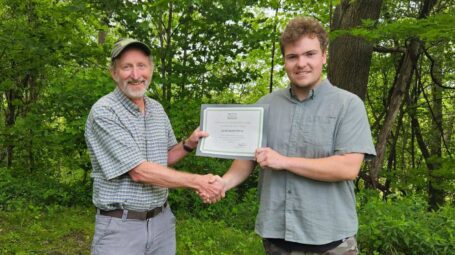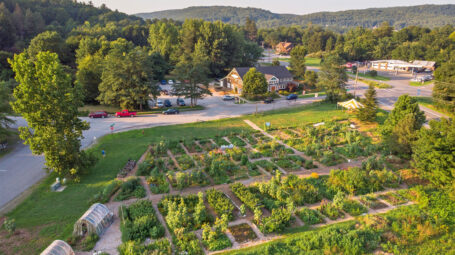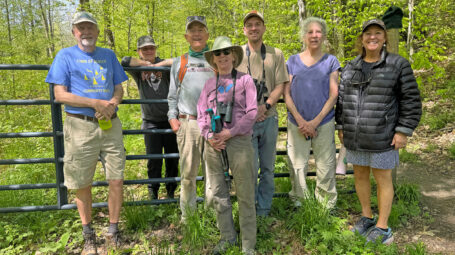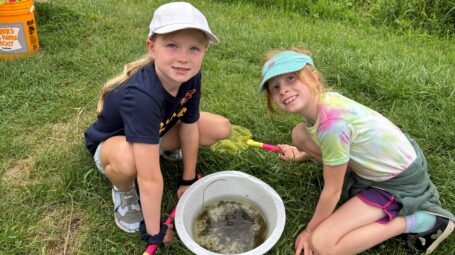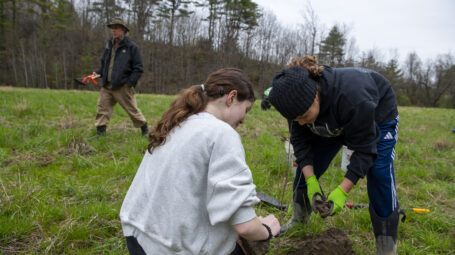Nonprofit and partners secure future of African American-owned family farm
In December 2023, Clemmons Family Farm, Inc., an African American-led nonprofit organization, celebrated its purchase of the historic Clemmons farm in Vermont after a successful fundraising campaign. The campaign’s success was made possible by the support of a number of partnering organizations and individuals who gave grants and donations — alongside the sale of a conservation easement on the farm — to safeguard the farm’s future as a vital cultural, historical, and agricultural site in Vermont.
The significant achievement coincided with the 100th birthdays of the farm’s previous owners — Dr. Jackson Clemmons and Mrs. Lydia Clemmons — who were both born in 1923. The couple purchased the farm in 1962 and maintained the property as a working farm, restoring its many historic buildings (some dating back to the 1700s) and creating a space to share African American history, culture, and arts. The couple owned the farm for 61 consecutive years until it was purchased by the nonprofit named in their honor.
The Clemmons Family Farm is today a significant arts and culture center and historic site that mobilizes a state-wide network of more than 260 Vermont artists of the African diaspora.
“We are immensely grateful to the many outstanding organizations and individuals who came together to make a transformative investment in securing an important part of Vermont’s past and future. We will keep up the momentum in this exciting new chapter for the farm and our diverse communities,” said Dr. Lydia Clemmons, president and executive director of Clemmons Family Farm.
Lifting Up an African American Legacy
“The impact of the Clemmons elders extends far beyond the borders of their family farm in Charlotte,” shared Dr. Margaret Bass, a Clemmons Family Farm Board Member in a release issued by the Clemmons Farm nonprofit. “They were bold pioneers — not only in farming and land stewardship, but in historic preservation, medicine, nursing, and the arts. They were among the first African American doctors and nurses (respectively) to be hired by the University of Vermont in the 1960s. They opened one of the first African art import and mail-order businesses in the country and ran it from their farm. Throughout their lives in Vermont, they have been very active as volunteers at local, state, and national levels and have consistently championed civil rights, education, and economic empowerment for all.”
Encompassing 138 acres of prime agricultural land, forest, and wetlands with six historical buildings, the Clemmons farm is an official landmark on Vermont’s African American Heritage Trail. It stands as a living history site, exemplifying a story of the Clemmons elders’ vision, commitment, and love for their heritage and their community.
According to the 2017 USDA census of agriculture, farms run by African Americans account for only half of one percent of all US farmland. Only two-thirds of these African-American farms own all the land they farm. These sobering statistics make the collective efforts to save the Clemmons farm an inspiring national model for the preservation of Black-held land and places that hold cultural and historical significance.
A Bold Decision to Preserve, Empower, and Build
Confronted with the possibility that Vermont could lose an important part of its history and natural resources as the farm’s owners approached their centennials, the nonprofit organization united a diverse array of partners to quickly mobilize the funds needed to purchase the farm and to secure both its history and its future.
Some of the funds raised to purchase the farm came through the sale of a conservation easement that permanently protects the farmland, unique natural communities, wetlands, and streams, while maintaining opportunities for continued educational, cultural, and recreational uses of the farm. The easement is held by VLT and Vermont Housing and Conservation Board (VHCB). Additional funding was provided by the American Farmland Trust.
“It’s been an honor to join with Clemmons Family Farm and several other partners to protect this land and secure its future,” said VLT’s Bob Heiser. “This farm plays an essential role in connecting people to African-American history and arts, and to Vermont’s agricultural heritage.”
VHCB executive director Gus Seelig agreed. “Our Board is pleased to have played a role in protecting this significant parcel of Vermont’s agricultural landscape,” he said. “We offer our congratulations and thanks to Clemmons Family Farm for their vision and commitment to continued development of the site and programs for its many historic and cultural values. Their work enriches Vermont and we wish them continued success.”
The Vermont Community Foundation, Trust for Public Land’s Black History and Culture Program, and Foodshed Capital, a nonprofit, non-extractive loan fund based in Virginia, were among the many supporters of the fundraising effort. The remainder of the funds to purchase the farm came from generous Vermonters’ grants and private donations.
What’s on the Horizon
With the historic farm secured, Clemmons Family Farm is gearing up for significant infrastructure improvements on the farm, increasing the number of its staff and volunteers, developing new agricultural and outdoor recreational programming, and expanding its educational, cultural, and arts programs for Vermont communities.
These future enhancements will be supported through ongoing fundraising efforts, ensuring the continued growth and impact of the farm both as a major economic platform for Vermont’s Black artists and farmers, and as a meaningful place for bringing community members together across differences of race and cultural heritage.

